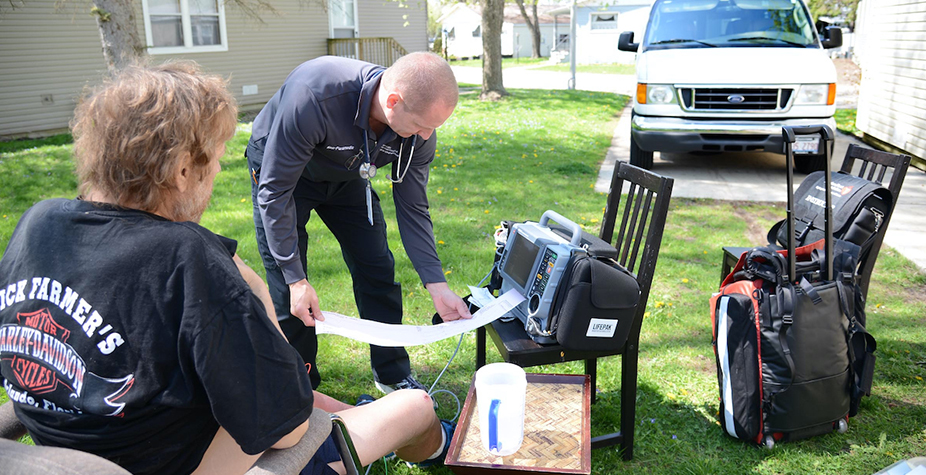Home Health Program Seeks to Improve Access to Support Services, Information
Posted on by
In observance of National Preparedness Month, the Center for Preparedness and Response (CPR) will publish posts in September that highlight ways people and organizations are helping to “create community” where they live.
This student-authored post is published by CPR in partnership with Medill News Service and the Northwestern University Medill School of Journalism, Media, Integrated Marketing Communications. The views and opinions expressed in this article are the author’s own and do not necessarily reflect the views, policies, or positions of CPR or CDC.
Paramedics in Elgin, Ill., stop at the home of an elderly man who was recently discharged from the hospital for uncontrolled diabetes. They first check the man’s vitals, including blood pressure and blood sugar levels, and then review information about his condition and treatment plan with him.
As part of the Mobile Integrated Healthcare (MIH) Program at Advocate Sherman Hospital, a free support program offered primarily to elderly patients with chronic diseases who need additional home health support, these paramedics are helping to narrow the health literacy gap.
Paramedics use weekly one-on-one home visits to help optimize health outcomes among community residents whose low levels of health literacy could put them at increased risk of getting COVID-19. CDC defines health literacy as an individual’s ability to understand basic health information and services to make informed health decisions.
Beyond providing sources of information, MIH paramedics bring a personal touch, serving as an additional support system for patients. This is part of the reason why Sara Larson, a nurse at Elgin Family Physicians, refers patients to the program.
“This program makes patients feel like someone cares about them,” said Larson. “It makes a big difference to see patients’ realities in their homes and adapt their care accordingly.”
Home visits are also opportunities for patients to review their health information and ask questions outside of the hospital, she added.
MIH works with patients who have been hospitalized at least once for chronic obstructive pulmonary disease, diabetes, asthma, pneumonia, or heart failure. It is the only hospital-based paramedicine program in the state.
Tina Link, manager of community outreach at Advocate Sherman and MIH program director, said the program was started to reduce the number of visits to emergency departments for issues that could be managed at home. Issues such as getting prescription refills and not knowing what medication to take.
“There’s a knowledge deficit,” she said. “Some patients don’t know where to go or who to ask. But they know the hospital is open and someone will take care of them.”
Paramedics teach patients how to navigate the health care system so they can understand their conditions and make informed decisions about their care. The goal of the program is to reduce unnecessary hospital admissions and decrease costs.
Last year, MIH successfully lowered hospital readmission rates for their program participants by 58%, according to data provided by Advocate Sherman.
The COVID-19 pandemic has amplified the importance of this program. Both the elderly and patients with certain underlying medical conditions are at increased risk for severe illness from COVID-19, according to CDC.
“Especially with COVID-19, we don’t want people in the hospital who don’t need to be here,” said Jill League, community wellness coordinator at Advocate Sherman, who actively oversees the MIH program. “We want our patients to know how to control their condition so that they can stay home, stay healthy, and have a better quality of life.”
In the five years since the program’s establishment, Link and League agree this year is one of the most impactful. After the onset of the pandemic in March, they said they immediately integrated COVID-19 information into MIH’s curriculum. Paramedics cover COVID-19 signs and symptoms, safety guidelines, and how to self-quarantine.
Program participants have been responsive to this mission. Link said she has noticed patients becoming more conscious of their health and behaviors. They acknowledge that their medical history may put them at increased risk for severe illness from COVID-19 and are eager to work with the paramedics to better understand their health.
“COVID-19 does not just target a certain population,” said Link. “It’s new for everyone and we’re all at risk, so we’re all in this together.” The universality of the pandemic encouraged patients not only to keep themselves healthy but also to protect their neighbors.
MIH has navigated the barriers of limited mobility and uncertainty this summer to offer patients safe, personalized health care in their own homes. Paramedics wear appropriate personal protective equipment and follow proper hygiene protocols between home visits, as recommended by the CDC.
Advocate Sherman’s intervention has not only successfully improved health literacy in Elgin but also has bridged together providers and patients to shape a resilient, well-informed community during these unprecedented times.
Posted on by

